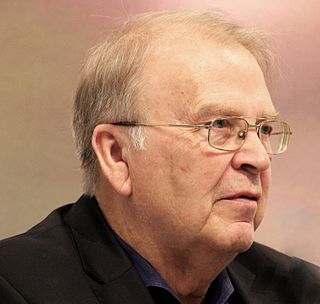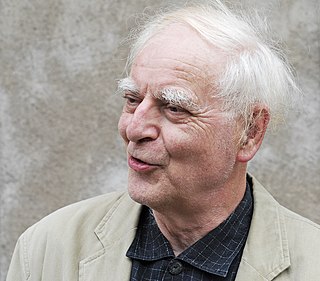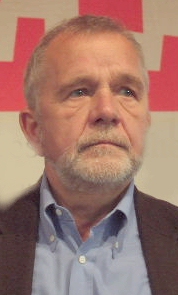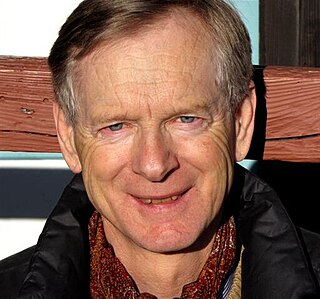
Wilhelm Genazino was a German journalist and author. He worked first as a journalist for the satirical magazine pardon and for Lesezeichen. From the early 1970s, he was a freelance writer who became known by a trilogy of novels, Abschaffel-Trilogie, completed in 1979. It was followed by more novels and two plays. Among his many awards is the prestigious Georg Büchner Prize.

Karl Dedecius was a Polish-born German translator of Polish and Russian literature.

Adolf Muschg is a Swiss writer and professor of literature. Muschg was a member of the Gruppe Olten.

Arnold Stadler is a German writer, essayist and translator.

Rüdiger Safranski is a German philosopher and author.

Raoul Schrott is an Austrian poet, writer, literary critic, translator and broadcast personality.

Ursula Krechel is a German writer.

Terézia Mora is a German Hungarian writer, screenwriter and translator.
Hermann Karl Lenz was a German writer of poetry, stories, and novels. A major part of his work is a series of nine semi-autobiographical novels centring on his alter ego "Eugen Rapp", a cycle that is also known as the Schwäbische Chronik.

Ernst Peter Fischer is a German Historian of Science and Publicist.

Karl Krolow was a German poet and translator. In 1956 he was awarded the Georg Büchner Prize. He was born in Hanover, Germany, and died in Darmstadt, Germany.

Walter Kappacher was an Austrian writer. In 2009 he was awarded the Georg Büchner Prize.

Reinhard Jirgl is a German writer.

Lutz Seiler is a German poet and novelist. Considered one of the most important German poets living today, he is the author of numerous books of poetry, prose, and essays, and gained national attention for his debut novel Kruso. In 2023 he was awarded the Georg Büchner Prize, the most prestigious award for German literature. He has served as the literary director and custodian of the Peter Huchel Museum since 1997.

Burkhard Spinnen is a German author.

Jan Wagner is a German poet, essayist and translator, recipient of the Georg Büchner Prize and Leipzig Book Fair Prize.

Peter Hamm was a German poet, author, journalist, editor, and literary critic. He wrote several documentaries, including ones about Ingeborg Bachmann and Peter Handke. He wrote for the German weekly newspapers Der Spiegel and Die Zeit, among others. From 1964 to 2002, Hamm worked as contributing editor for culture for the broadcaster Bayerischer Rundfunk. He was also a jury member of literary prizes, and critic for a regular literary club of the Swiss television company Schweizer Fernsehen.
Norbert Miller is a German scholar of literature and art. He was professor of literary studies at the Technische Universität Berlin from 1973 and retired in 2006.

Ilma Rakusa is a Swiss writer and translator. She translates French, Russian, Serbo-Croatian and Hungarian into German.

Ulrike Almut Sandig is a German writer. She was born in Großenhain in the former GDR, and has lived in Riesa, Leipzig and Berlin. She studied religious studies and indology at university, and then studied at the German Institute for Literature in Leipzig.


















